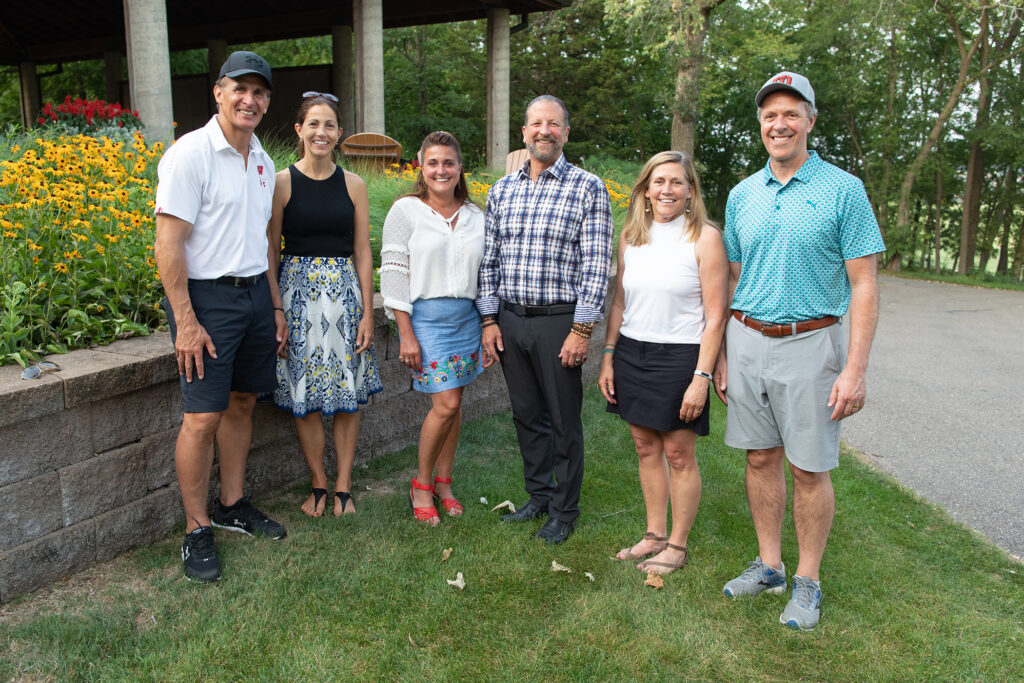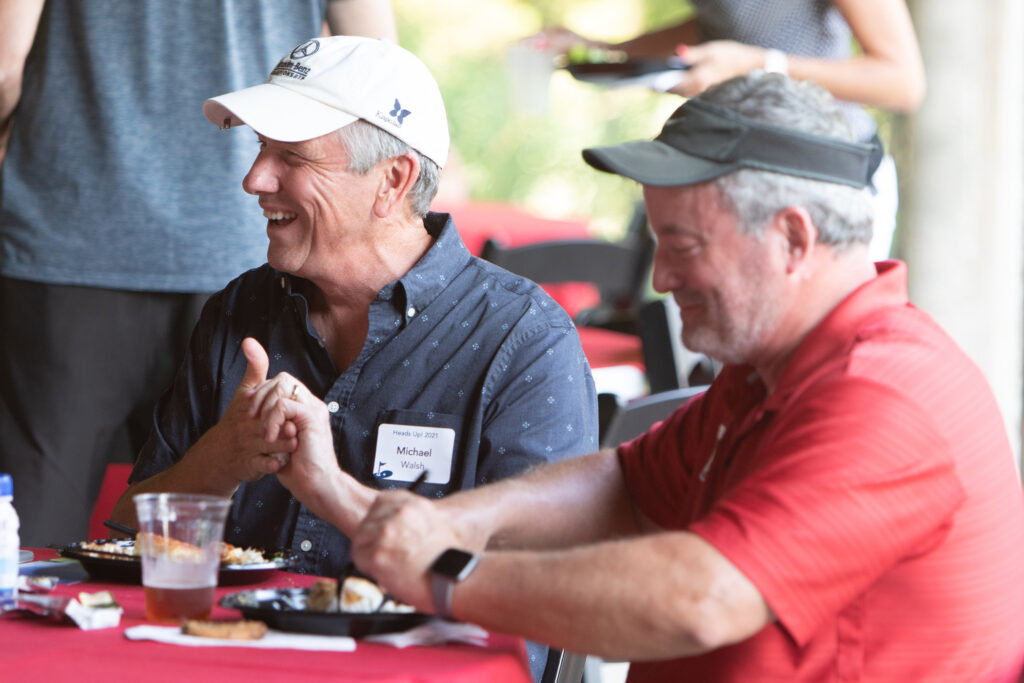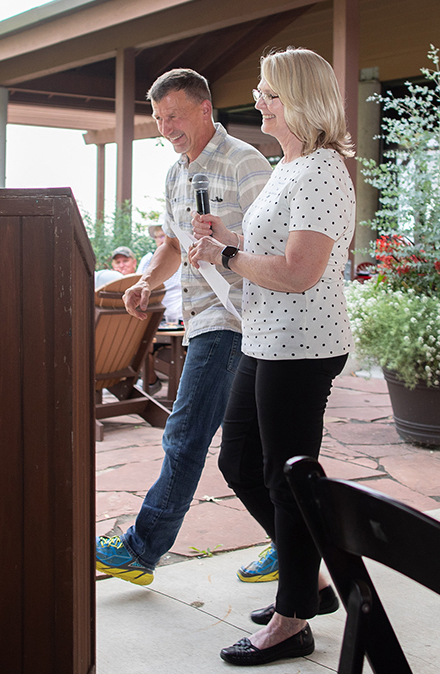
An enthusiastic group of 130 participants attended the Heads Up! Golf Outing at University Ridge Golf Course on July 26 to raise money for head and neck cancer research and treatment at the University of Wisconsin and to honor those affected by head and neck cancer as well as those working to improve treatments. This year’s event raised over $39,000 for head and neck cancer research activities.
Among the many head and neck cancer survivors there were Tod Noffke and Teal Bainbridge, who talked about their experiences as patients at the UW Carbone Cancer Center. Also on hand was UW Men’s Hockey Coach Tony Granato, who shared his experience providing support for his brother and other family and friends during cancer treatment.
Research progress
Dr. Paul Harari, chairman of the Department of Human Oncology, hosted the event and talked about the importance of improving head and neck cancer care and the progress the university is making.
“We continue to make meaningful progress for head and neck cancer patients,” Dr. Harari said. “Each year, bit by bit, step by step, we improve the precision of surgery and radiation and the capability of drugs to enhance surgery and radiation to effect higher cure rates with fewer side effects.”
In 2016, Dr. Harari led a team of researchers that earned a five-year, $12 million National Cancer Institute Specialized Programs of Research Excellence (SPORE) grant to conduct translational research focused on improving treatment and outcomes for head and neck cancer patients. UW became one of only two or three institutions in the nation to hold a prestigious head and neck cancer SPORE grant during the last five years.
“I can’t think of anyone who is more tenacious as a leader than Paul Harari,” said Dr. Greg Hartig, UW chief of Head and Neck Surgical Oncology in the Division of Otolaryngology in the Department of Surgery. “He’s so committed to head and neck cancer research and to making things better for those who suffer from this disease.”
This year, the grant is up for renewal, and because of the SPORE team’s talent and hard work, Dr. Harari expressed cautious optimism that the SPORE could be renewed.
“The work we do is inspired by our patients, Dr. Harari said. “We owe it to these cancer patients to do better for them every year. Facing head and neck cancer is a monumental challenge. It can affect the way you speak, the way you swallow, the way you taste, the way you kiss a loved one. It’s a challenge to overcome head and neck cancer and we are striving to make it better for future patients.”

Tod Noffke
In late 2018, Tod Noffke was diagnosed with human papillomavirus-related cancer of the base of his tongue. He recalled the seven weeks of radiation therapy combined with radiation and the long drives in the dead of winter to get to his appointments, and the importance of having support.
“I felt really good about good about the people I worked with down here [at the UW Carbone Cancer Center],” Noffke said. “I can’t say enough about them. It was just an all-around great experience. My family and friends rallied. I had more help than I could use at times. I don’t know how someone who doesn’t have a good support can make it through.”
Noffke experienced many of the side effects associated with treatment. He needed a feeding tube because swallowing became impossible, and he lost a lot of weight. However, he never lost his voice or salivary function—common side effects of radiation. “When I asked my doctors what’s next, they had a pretty good idea, but it’s different for everybody. Every body is different. Every cancer is different.”

Teal Bainbridge
During a routine dental appointment Teal Bainbridge’s dentist noticed a white patch on the side of her tongue. She consulted with Dr. Hartig, who determined it wasn’t cancer at first. She went to Dr. Hartig for follow-up visits over the years, and the white spot eventually became cancerous and needed treatment. She had part of her tongue removed surgically followed by brachytherapy, in which four catheters were inserted through the bottom of her chin through her tongue to deliver radioactive seeds to the treatment area twice a day for several weeks.
“I tried to learn everything I could about the type of cancer I had and treatment I would be going through,” Bainbridge said. “I wrote down questions, which helped me feel more in control of the situation. And I focused on trying to stay positive.
“I had an incredible support system—family, friends, Dr. Hartig, Dr. Harari, and the team at UW. Having everybody behind me every step of the way helped me stay strong through the treatment.”
Tony Granato
UW Men’s Hockey Coach Tony Granato hasn’t had cancer himself, but like most of us, he’s had multiple people in his life who have had cancer. He was on hand to support head and neck cancer research and share his story.
Fifteen years ago, his brother was diagnosed with hodgkin’s lymphoma. “When you hear the news, the world just stops. What do I say? What do I do? How do I become that support system? There’s no playbook on how to be a big brother to a cancer patient. I learned to mostly just be there and not ask a lot of questions. The courage and the attitude and spirit he had through the whole thing is something I totally admired. It reminded me a lot of the hockey players I coach.”
Granato also expressed his strong admiration for the cancer specialists at the UW Carbone Cancer Center and the importance of supporting them. “Cancer affects all of us. I know why we’re all here today. What we can do is what we did today—we can encourage them. We can show them how much we love and respect what they do for us and find ways to give them more funds to be able to continue their research.”